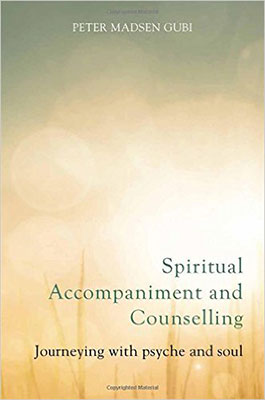Spiritual Accompaniment and Counselling: Journeying with psyche and soul
Edited by Peter Masden Gubi
Jessica Kingsley Publishers 2015 paperback 192 pages £16.99
Here at Sarum College (www.sarum.ac.uk) our two year certificate in spiritual direction is very popular to a wide variety of individuals who wish to build upon, reflect and improve their practice. In a world dominated by individualism, consumerism and materialism all of us need places and people we can draw upon for support, friendship and direction. This is particularly the case when we face crossroads, choices or crises.
As I write (10th July 2016) the General Synod of the Church of England has gone into private session to continue its deliberations about how far and to what extent it can embrace the agenda of inclusivity around gender and sexuality. While there are strong feelings on all sides there are far too many individuals and groups who regard Christianity with suspicion and even would want to place a significant health warning to its ability to embrace the ever wider and sometimes more complex horizons of people’s identity and experience. One might argue that there is a great deal that is lost in this political marginalisation. Put another way – who do we turn to when life becomes difficult and perplexing? The danger for the church is that its spiritual wisdom is overlooked in favour of therapy and therapeutic practice.
This volume of essays, nine in all, attempts very successfully to explore what it might be like to attune to the spiritual processes of other people especially in the area of crisis, abuse, grief and pain. The essays intelligently explore the lifespan and how forgiveness and wholeness might be embedded into practice. The Christian tradition has a great deal to learn from the way in which psychotherapy and counselling seek to embrace a spiritual dimension. One might argue that if one wants to look for creativity and life in matters of the soul and spirit then it is to the liminal edges that one might look. These essays represent the very best of that creative liminal margin.
These are carefully written and skilfully edited essays. They deal with relationship, forgiveness, spiritual crisis, pain, suffering, lifespan development, grief and spiritual abuse. There is an excellent essay by Lynette Harborne on the importance of supervision and as ever with Jessica Kingsley books the book is attractively printed with a clear index and bibliography. Clarity and skilfulness in presenting complex material is one of this book’s key strengths.
Gubi writes in his introduction that this book is written to heighten practitioners awareness of the spiritual dimension in listening (page 22) – what follows in the subsequent 170 pages will stimulate, illuminate and expand horizons in such a way that we might all be challenged to work for human flourishing and societal well-being.

